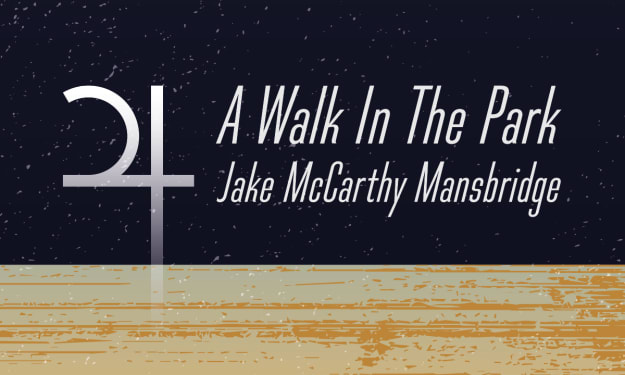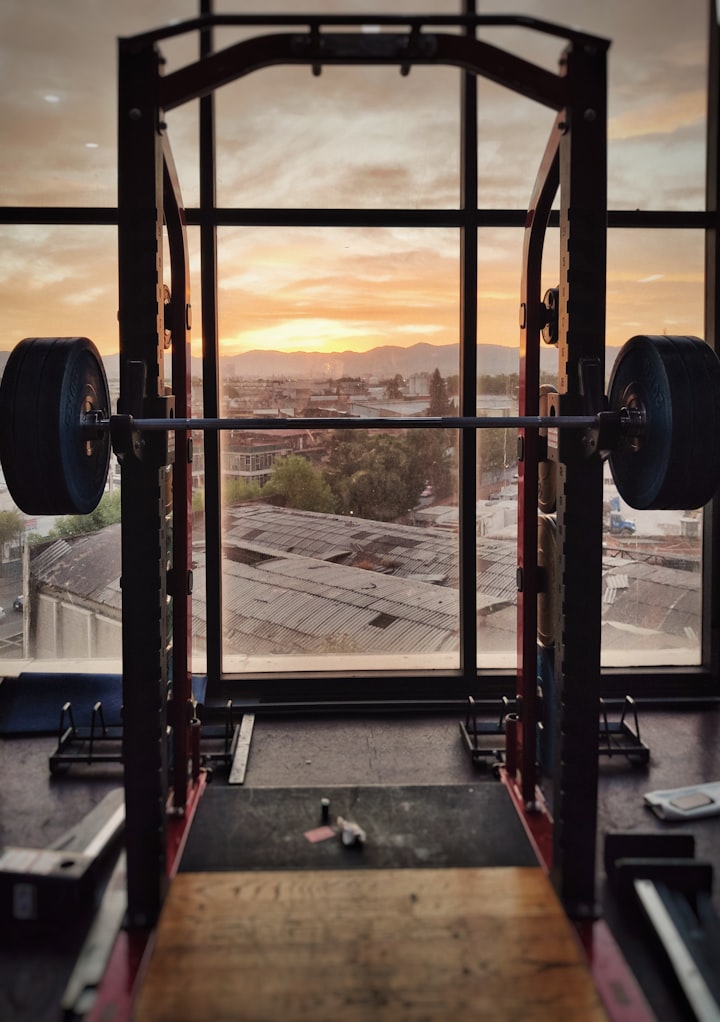The Man That Gravity Forgot
A story of fate.

“Corporal Stevens,” crackled the radio of my re-entry pod, “Come in, Corporal Stevens.” It crackled again, followed by a brief period of radio silence.
“Corporal Stevens receiving, Houston,” I replied, ever anxious about my mind-bogglingly rapid re-entry into the Earth’s atmosphere.
“Re-entry is currently looking too shallow. Remotely adjusting trajectory—hold steady.” The man on the other end of the radio was a communications technician by the name of Sid Stanley. I’d only ever met him once, but he seemed like a lovely chap. Even though I’d only met him once in person, I’d talked to him at least once every hour for the past two days. He was the chief communications guy, so he had to put up with my many questions on the utility run I'd just completed.
I should fill you in about what exactly I'm doing here in this tiny capsule, hurtling towards Earth. I was designated to repair an external module on the United States Space Unit Satellite (or the USSUS for short). Now, I know what you may be thinking: 'Oh, orbital space travel in the 2060's is routine and easy!'—let me tell you just how wrong you are. This repair is by no means routine. I was fired at the USSUS roughly forty-four hours ago in a rocket built by the lowest bidder, in order to repair a problem with an anterior thruster on the station hull. Now, this particular problem is rather a delicate one, and one which had to be dealt with as soon as possible due to the nature of it. The onboard thrusters are the things which correct the orbit of the station when it goes slightly astray. This problem ultimately means that if the station were to be hit by a small piece of space debris, the station could be flung out of orbit—or plummet to Earth. So, naturally, it was up to me to fix it. Not only that, but because the repairs were so urgent and unexpected, the rocket I was sent in was designed and built in a matter of months… which filled me brimming full of confidence on my trip up here.
My forty-four hour jaunt to the edge of space had been taxing, to say the least—the nature of the satellite meant that I had to dock into the station's port module, enter the spacewalk suit, exit the spacecraft, do the repairs, enter the spacecraft, exit the spacewalk suit, enter the return pod, uncouple the pod from the module, and aim roughly at Earth.
Well that's the previous forty-four hours accounted for—now I'm on my way home.
“Corporal, remote adjustments have failed—repeat, remote adjustments have failed,” crackled the voice of Sid Stanley, much to my dismay, because that meant it was my turn to attempt to adjust my trajectory myself from onboard.
“Received, Houston,” I sighed.
“Onboard attempts to adjust trajectory must be made, Corporal.” Sid's voice sounded strained, sort of tense. Perhaps it was just me… or perhaps it was because I'd heard a rumour about the offices that if there is an onboard malfunction on a spacecraft, and attempts to remotely fix the problem have failed, Houston inevitably hands over to the occupant of the vehicle, by which point they are no longer liable for your actions, and are therefore not at fault in the occurrence of an accident, and in turn—their budgets remain the same. So, that made me a little tense as I took the controls and began to attempt a manoeuvre.
"Onboard adjustments are failing too. Can't even see if the left thruster is working at all. Over,” I nervously reported to Sid, and the entire Communications and Controls Department who were no doubt listening in.
“Running diagnostics, hold tight Corporal.” Sid paused for what seemed like an eternity.
“Anything?” I asked impatiently, completely disregarding NASA's strict radio communication policies.
“All power has been lost to the propellant systems. I- I don't think there's anything I can do.” Sid sounded sorrowful, desperate.
“Well is there anything I can do my end?” I asked impatiently, beckoning an answer.
“Not unless you can get on the outside of the pod and reboot whatever's causing the power failure, and I can't even tell from here what the cause of that is,” Sid replied, calmly, but with a significant element of building panic, “I'm sorry Corporal.”
“I can't do that, Sid—the protective suit I'm wearing isn't that protective, I'll freeze and boil simultaneously!” I barked, albeit understandably.
“I know, Corporal. I'm sorry.” Sid mourned on the other end of the radio.
Neither of us said what this meant, but we both knew it—as did everyone back at Houston.
Only two more silent minutes passed when I felt it happen. And that was it—that slight, soft fizzing was the indication that I'd just skimmed the atmosphere. Skipped off it, away from Earth—the wrong direction, obviously.
Now I had just eight hours of oxygen left. But what to do with those eight hours? Is there any point in those eight hours? There is literally no getting out of this: I am going to die. There's no recourse here, no rescue missions, no second chances, no alternative methods like there are in the movies. Whether it's in eight hours, or in three minutes, I am going to die. I mean, I know that everyone dies—let's face it, no one gets out of life alive—but I'm going to die soon. I didn't really plan on dying quite this soon.
For the past ten minutes or so, my mind has been the most active I think it has ever been (maybe it's just getting all my thinking out of the way before I go). I thought of my family and what would happen to them. I thought about my home, my dog—he'd never understand why I just didn't come back.
I thought about my job—and toyed with the thought that NASA might erect a statue in my honour. Quite a desperate thought, I suppose, but I would be the first American astronaut to die in space. 'Corporal Mark Stevens: The first American astronaut to die in space.' Hmm, has a ring to it, but probably a bit morbid. At least my family would get the film rights, however devastating and depressing it may be to relive the events leading up to my ultimate demise on the big screen.
I think I've decided. I stared at the escape hatch above me—sealed firmly shut, it was once a welcome barrier between me and certain death. Now it was a bitter-sweet opportunity. So do I end it all quickly and go out with a literal bang, or do I sit here and slowly asphyxiate? Oh what a lovely set of options.
The door handle was one of those lever-type handles (a bit like the ones you see on aeroplanes) and was covered in yellow and black warnings—each one more serious than the last, advising that under no circumstances should I ever open the door when in a pressure-less environment (such as space). Those warnings seem a lot like attempts to goad me on, now.
I'll be honest, I didn't even ponder it for long. I think I'd prefer a quick, relatively painless death than hours of gasping agony. So I've made up my mind, I think.
All that was left was to say my last goodbyes to my family—as utterly terrible and heartbreaking that was. My wife, my son, each sobbing uncontrollably. Understandably, of course—I was exactly the same. It was the most unbelievably, heart-wrenchingly painful thing I've ever had to do and I'd never wish it upon anyone.
The small, circular window to my left just framed the Earth so perfectly as it zoomed into the distance. I didn't really think the last time I stood on Earth would be the last time.
I said a brief goodbye to Sid, and the entire crew at NASA saluted me, commending my service to the Space Agency, then I requested radio silence.
The handle hung before me, like a lever to a new world. I didn't know what this new world held for me, but it had to be better than what this world had for me now. The sleek lines drew me in, pulling me to inspect them. Such fine machining, and yet such a small part to play in the overall effectiveness of the mission I was first set to complete. But now, it was everything. It held the answer to the question I hoped I'd never had to ask. It could solve all my problems. It had the power to change my final few moments in this life. It could save me. But in doing so, it would decidedly not save me. As I sat there, looking at this inanimate entity, it seemed to adopt a persona in my mind, as if it became a spokesperson for everything I could do at this point. It's like it knew it held my future.
Then, I thought again—in all my thirty-seven years, I'd never analysed something so much. A steel bar did that—a steel bar made me question my own reality. And I think that's when I made my mind up for sure.
I remember thinking, as I clutched the cold steel door lever—did the person who so meticulously designed such a functional mechanism realise that one day, its last act would result in the demise of a human?
I pulled the handle.






Comments
There are no comments for this story
Be the first to respond and start the conversation.